The majority of trade unions in the European service sector do not have collective agreements on AI in the workplace. This was the result of a recent survey by FES and UNI Europa.
In late 2022, Artificial Intelligence (AI) burst into the public consciousness with the emergence of ChatGPT, a chat-based form of AI systems that became accessible to everyone for the first time. The following year, Hollywood writers in the Writers Guild of America called out a strike that lasted 148 days. They were fighting – successfully – not just for more pay and job security, but also for limits to be placed on the use of AI in the writing process.
AI in the workplace – many opportunities, but also challenges
However, these manifestations of the power and challenges posed by AI in the public limelight tend to conceal the fact that AI and algorithmic management systems have been proliferating across a wide variety of industries for a number of years. While commonly associated with platform or gig economies, the fascination of managers at ‘conventional’ companies for AI and algorithmic-management systems is reaching new highs. For workers and trade unions, however, use of these systems at the workplace raises many issues, ranging from data protection and privacy to implications for working conditions, such as monitoring of the workforce, bias in decision-making processes, or even a potential violation of human rights.
AI widens the gap between executives and employees
For instance, AI systems are already widely used in recruitment management. These systems scan application documents according to specific criteria, conduct background checks through analysis of social media profiles, and preselect candidates accordingly. Consequently, applicants may be disqualified without their application ever undergoing human review. Another issue arises from the gap between managers and employees regarding access to knowledge about how AI systems work in the workplace. Moreover, these systems employ machine learning techniques to evaluate data, provide recommendations and make decisions – not only regarding hiring employees but also about their pay or dismissal – often without adequate human oversight.
First attempts at regulation at the European level
This issue has already been recognised by politicians, and the European Commission has introduced two groundbreaking directives at the European level that have recently been adopted (1). One is the AI Act, representing the first comprehensive regulation on AI by a major regulatory authority worldwide, which categorizes AI applications into three risk categories. However, it lacks specific protections for individuals in their workplaces. Therefore, trade unions are advocating for a directive on AI systems in the workplace.
Secondly, the directive on platform work includes an important chapter on algorithmic management in the workplace. Many platform workers, such as food delivery workers and Uber drivers, receive their orders and have their performance monitored via apps. Algorithms have replaced direct supervision from managers. Therefore, ensuring transparency and setting clear limits on the data accessible to algorithms is essential. The new directive includes a complete ban on the processing of certain datasets, such as mental health or religious affiliation. Additionally, private conversations or information unrelated to a person’s professional activity are considered taboo.
Nevertheless, these rules need to be applicable to all workers – not only those in the platform economy. Furthermore, the implementation of this directive into national law will take several more years before platform workers can benefit from its provisions. This highlights the ongoing importance of collective bargaining as a tool to enhance worker rights concerning the use of AI systems in the workplace.
The majority of trade unions do not have collective agreements on AI in the workplace
However, according to a survey by the Friedrich-Ebert-Stiftung (FES) and UNI Europa, the European trade union federation for 7 million service workers, only a third of employees in Europe are aware of the existence of such tools and their use in their workplace. Furthermore, the 2022 survey shows that 47 per cent of employees want strong collective agreements on technology in the workplace and data protection.
Two years later, however, it must be noted that not much progress has been made. A new, non-representative survey by UNI Europe of its member unions found that the majority (62 per cent) of unions in the European services sector still lack collective agreements that specifically address AI in the workplace (figure 1).
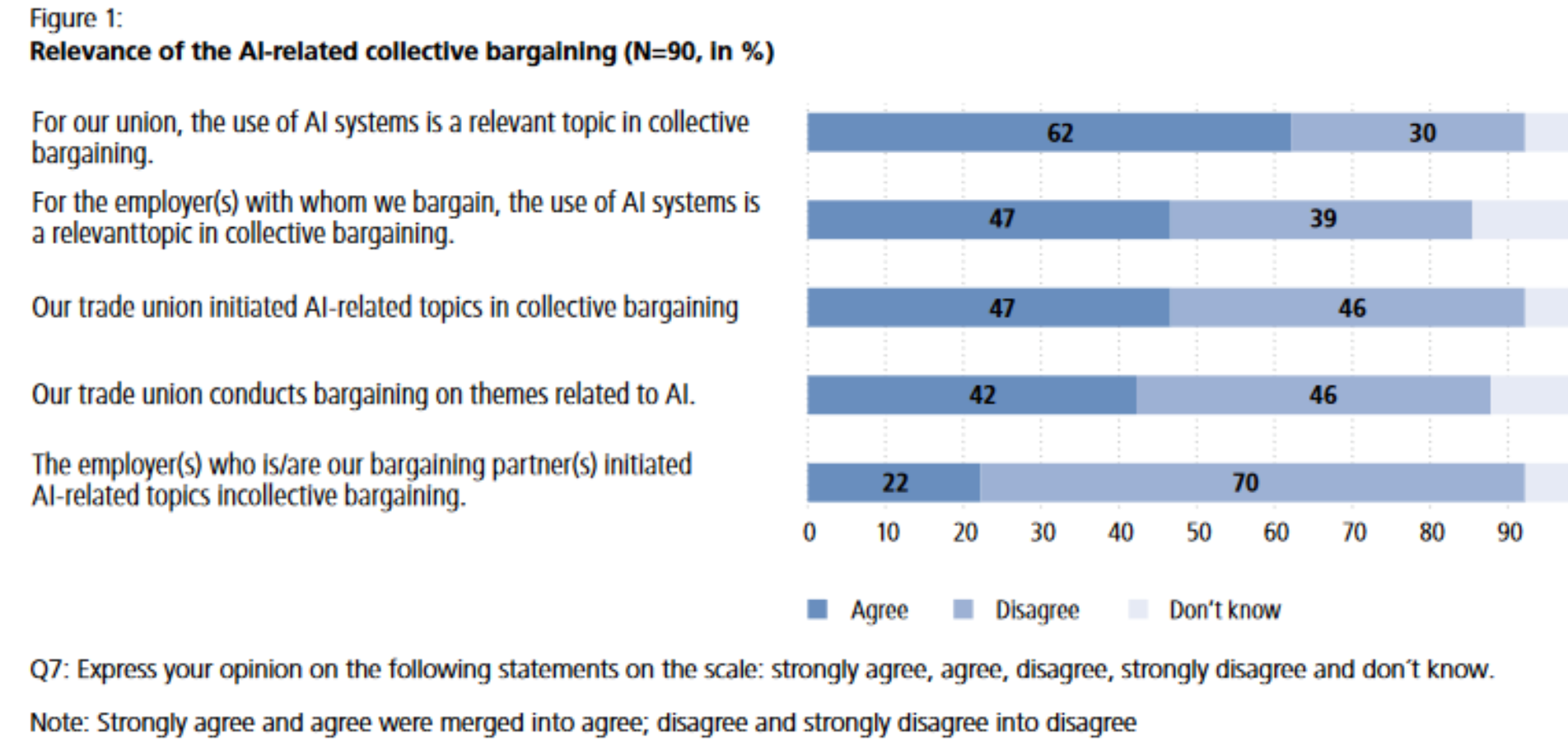
Source: https://library.fes.de/pdf-files/bueros/bruessel/21074.pdf, p. 9.
However, 42 percent of the surveyed trade unions are actively engaging in discussions and negotiations pertaining to various aspects of AI, although not exclusively through collective bargaining (figure 1). Specifically, unions are prioritising issues related to data protection, worker surveillance, workforce and job quality, as well as the recruitment process and work organisation.
Currently, in the realm of AI-related bargaining concerning data protection, trade unions primarily focus on ensuring compliance with relevant privacy and data protection laws, the collection, processing, storage, and utilisation of workers’ personal data, and limitations on the sharing of such data (figure 6). Regarding the use of AI tools for worker surveillance, trade unions concentrate their collective bargaining efforts on software aimed at monitoring digital or physical worker activities, accessing employee emails and messages, and deploying devices equipped with sensors for data collection purposes (figure 5).
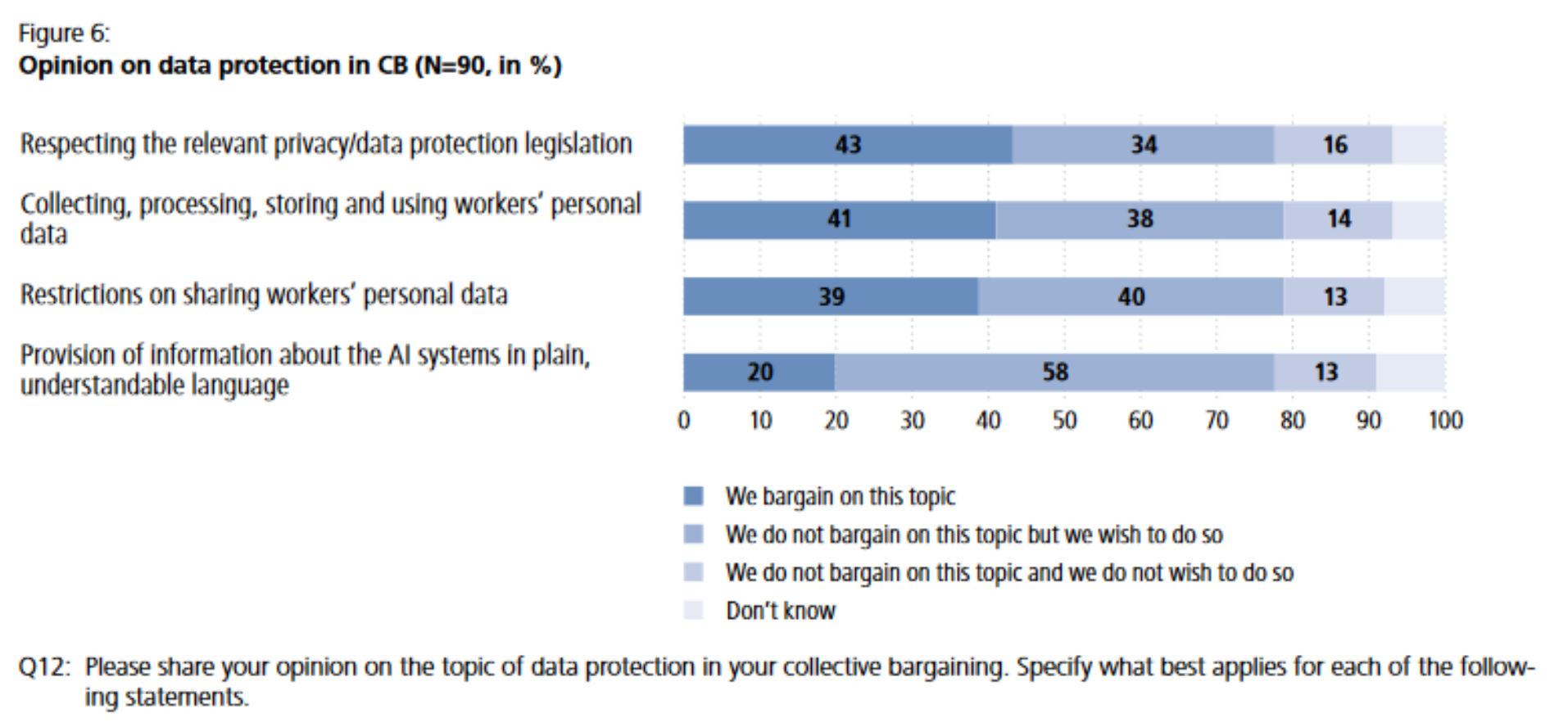
Source: https://library.fes.de/pdf-files/bueros/bruessel/21074.pdf, p. 11.
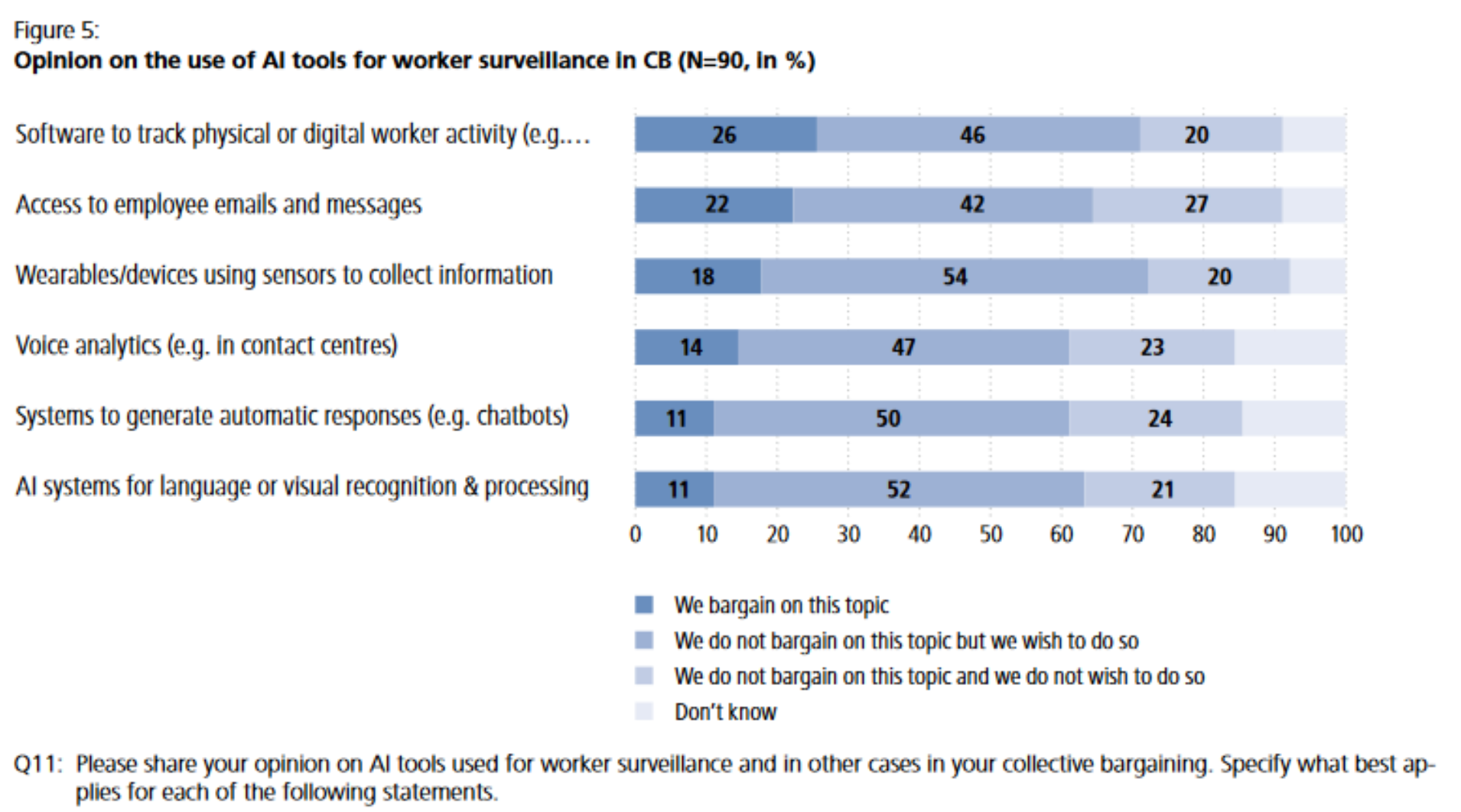
Source: https://library.fes.de/pdf-files/bueros/bruessel/21074.pdf, p. 11.
In the domain of AI-related bargaining regarding the workforce and job quality, key topics include the impacts of AI systems on working time and the right to disconnect, providing training for staff on new AI tools, and assessing the effects of AI systems on workload (figure 2). In the area of AI-related bargaining concerning the recruitment process and work organisation, the focal points are scheduling work shifts and implementing automated worker assessments based on output and performance targets or consumer ratings, and allocating tasks through algorithms (figure 4).
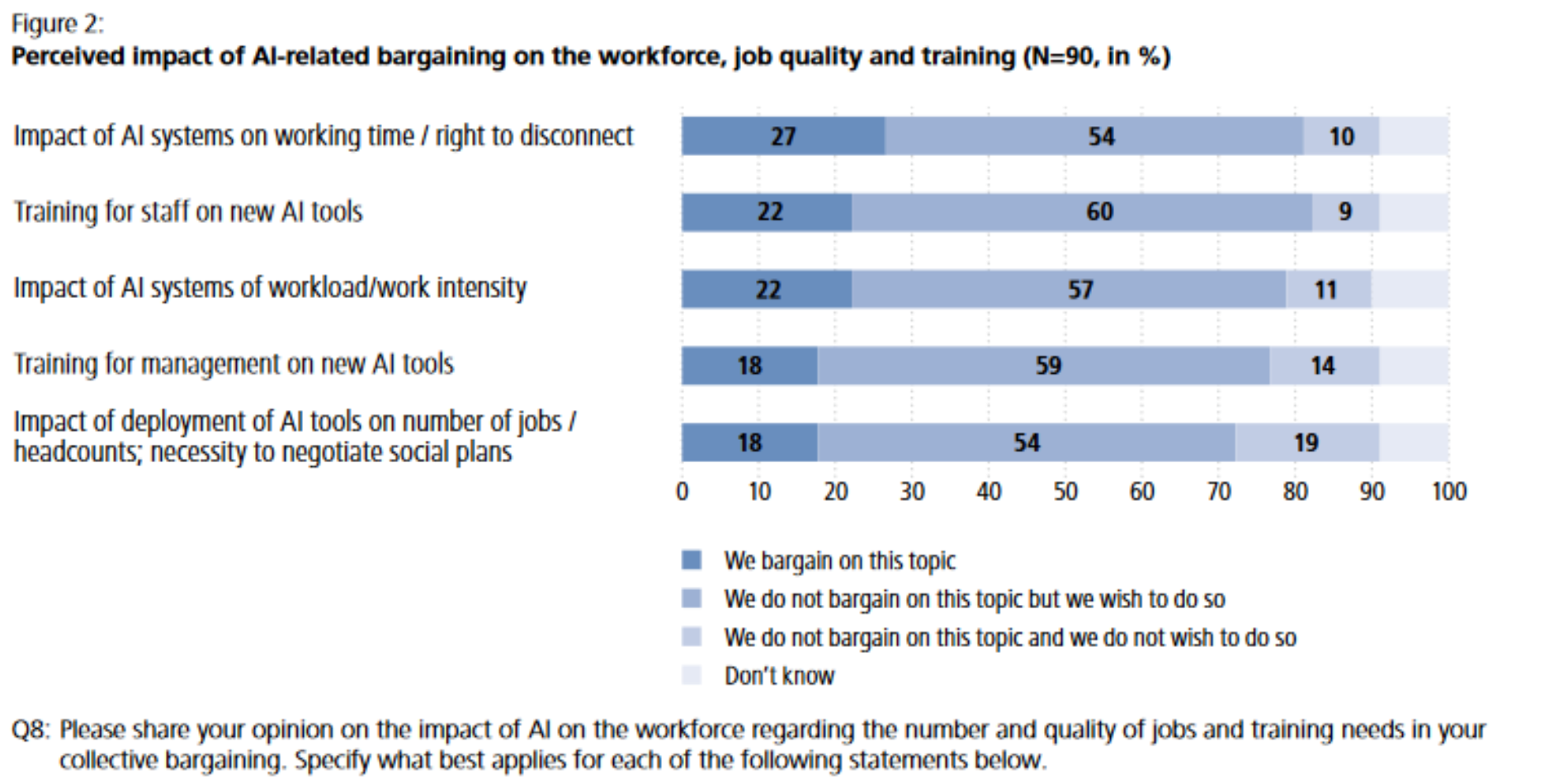
Source: https://library.fes.de/pdf-files/bueros/bruessel/21074.pdf, p. 9.
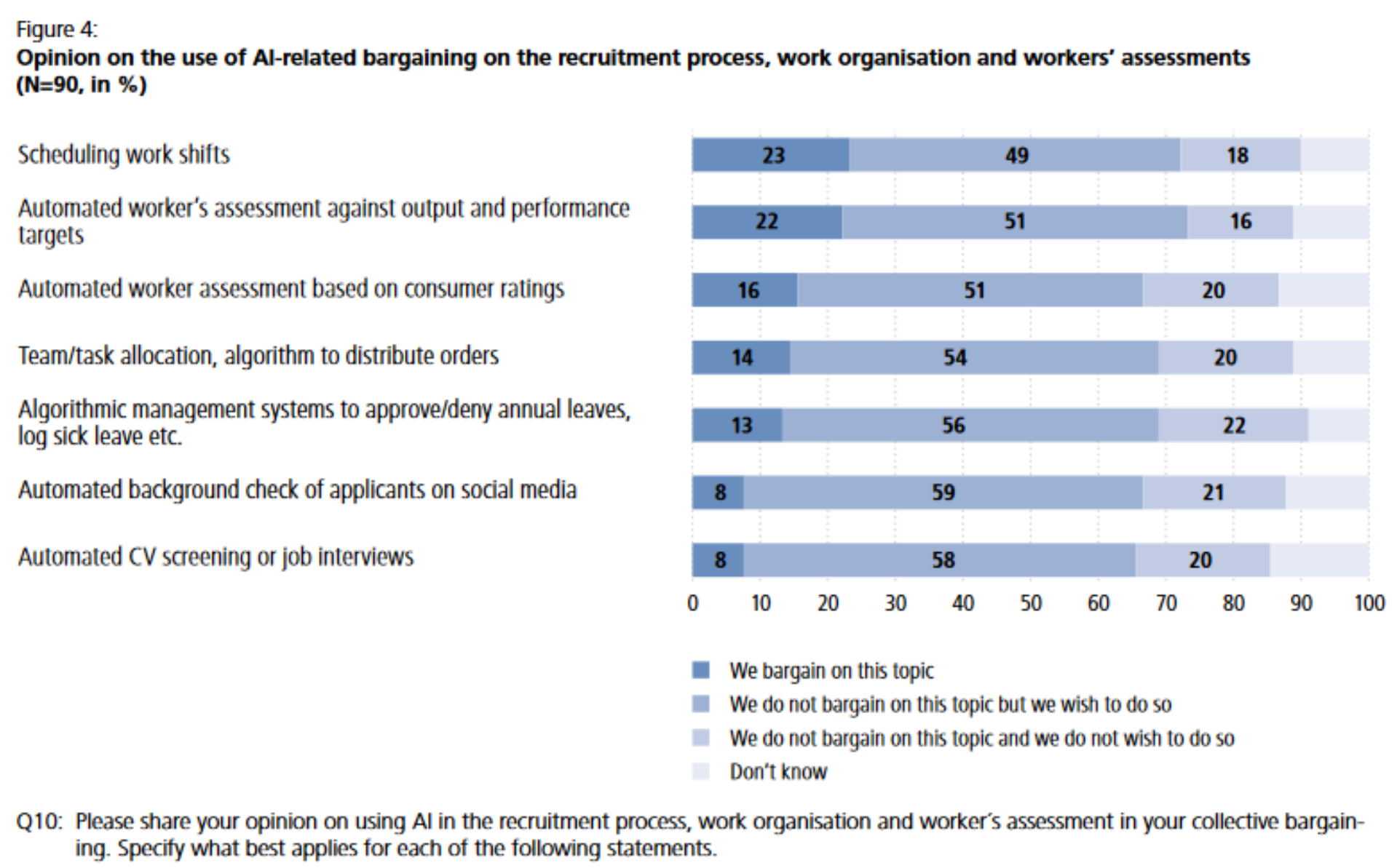
Source: https://library.fes.de/pdf-files/bueros/bruessel/21074.pdf, p. 10.
Workers’ rights on the wish list of trade unions
Furthermore, trade unions wish to bargain on additional AI-related topics that have not yet been negotiated but should be the subject of future discussions. This “wish list” encompasses employee rights, notably the right to contest decisions made by automated processes, as well as the right to counsel from external data experts. Additionally, there is a pronounced desire for the right to information and advice, such as through employee training, regarding the utilisation and assessment of AI tools (figure 8).

Source: https://library.fes.de/pdf-files/bueros/bruessel/21074.pdf, p. 13.
This survey was conducted as part of a joint research project between UNI Europa and the FES Competence Centre Future of Work, and it was published in March 2024. The project aims to raise awareness among workers and trade unions in the European service sector about the increasing use of AI systems in the workplace. It is supported by concrete examples of current collective agreements containing clauses on AI in the workplace. The project consists of two studies: the first aims to identify commonly used AI systems, while the second analyses the current situation of collective agreements on the use of AI systems by employers vis-à-vis employees. Specific clauses from various collective agreements are singled out and made accessible through a visually intuitive dashboard on the website of the FES Competence Centre Future of Work.
(1) See also: https://www.euractiv.com/section/economy-jobs/news/at-long-last-eu-countries-adopt-the-platform-work-directive/
-
 Oliver Philipp
Oliver Philipp
Policy Officer, Competence Centre Future of Work, Friedrich-Ebert-Stiftung, Brussels




